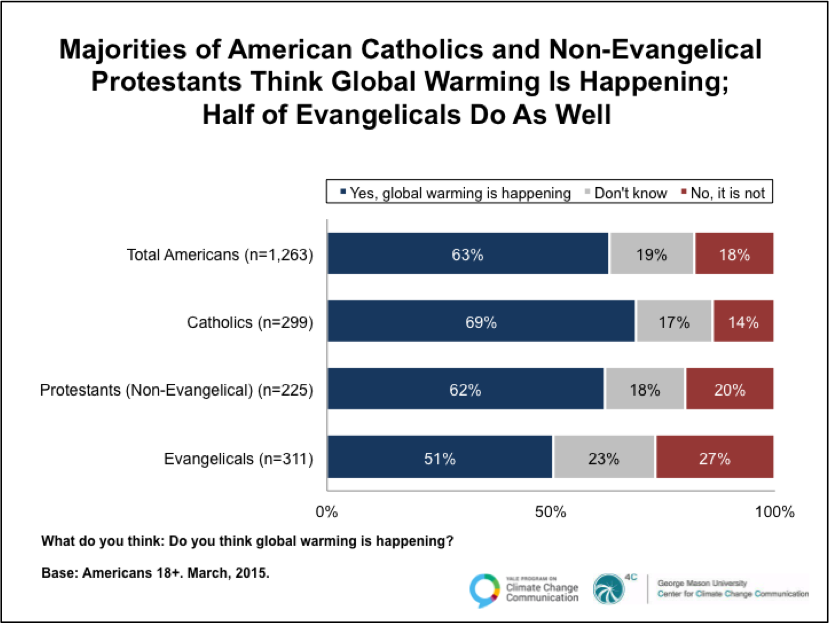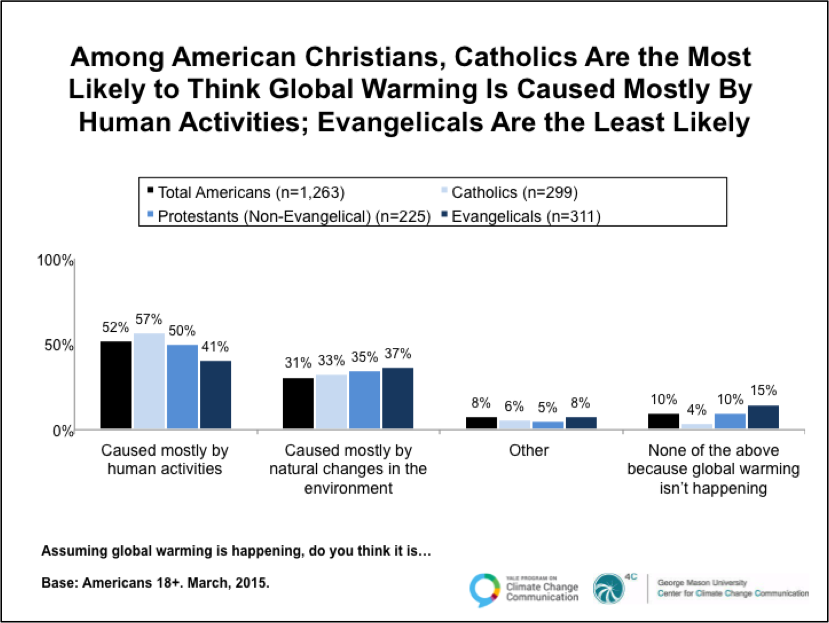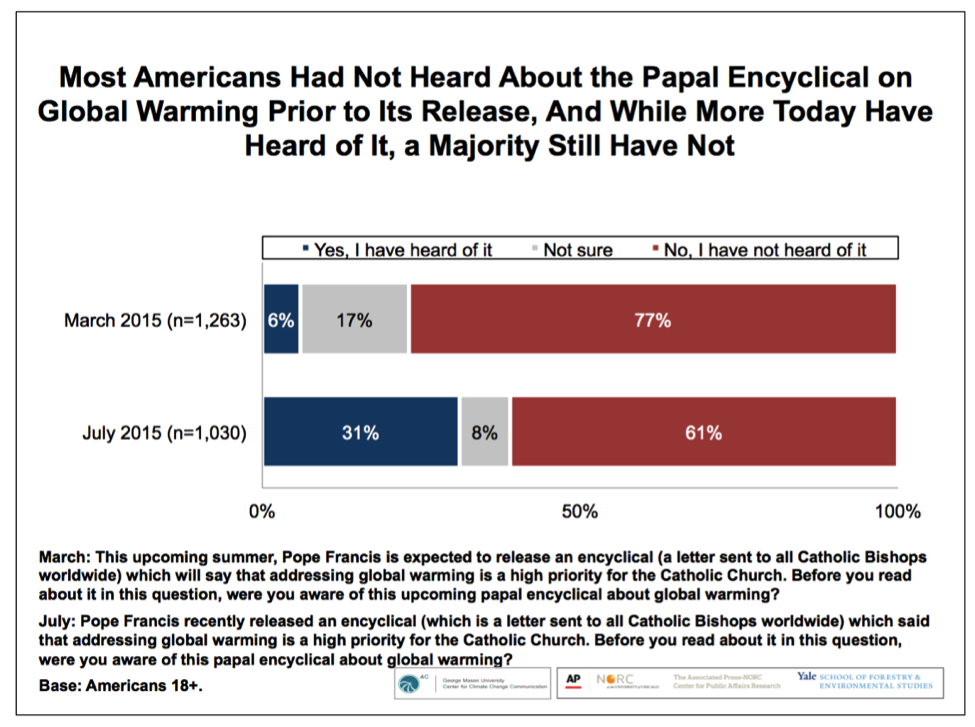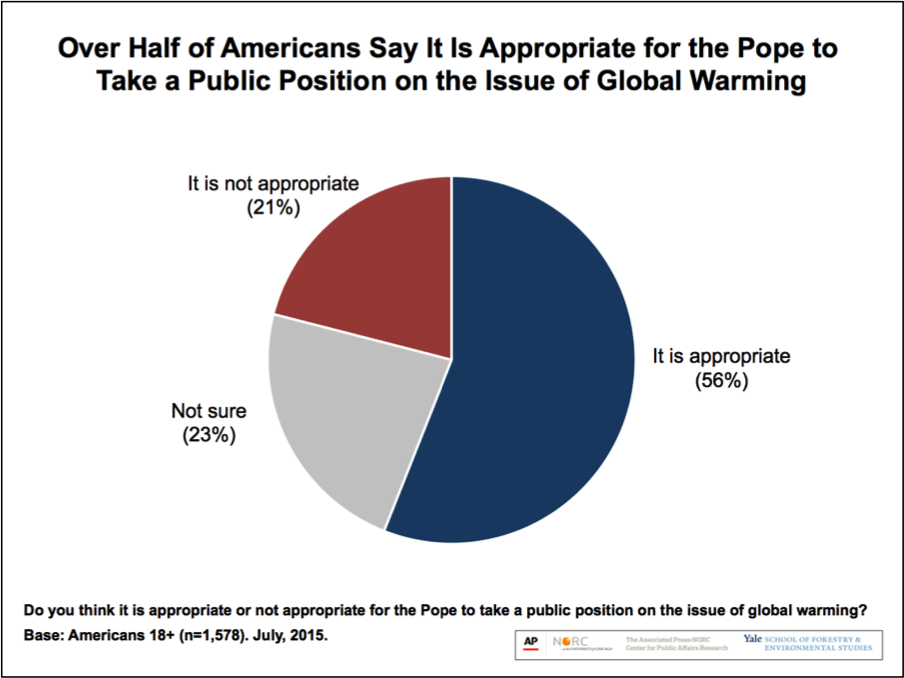For the Media · September 22, 2015
American Opinions on Pope Francis & Climate Change: A Summary of Research
By Anthony Leiserowitz, Zena Grecni, Bessie Schwarz, Geoff Feinberg and Seth Rosenthal
Climate change is expected to be a major focus of Pope Francis’ visit to the US. Overall, our research suggests the pope’s message is likely to be well received by Catholics, other Christians, and the American public at large. This document outlines the results of several of our nationally representative polls, conducted in partnership with George Mason University, and separately with The Associated Press and NORC, on climate change, Christians, and the pope.
Top Findings
- Pope Francis is a trusted source of information about global warming among all Americans.
- Over half of Americans (55%) say it is appropriate for the pope to take a public position on the issue of global warming.
- Nearly twice as many Americans say they are not aware of the papal encyclical as say they are aware (60% vs. 31%).
- About seven in ten Catholics (69%) think global warming is happening, which is 6 percentage points above the national average (63%).
- Among American Christians, Catholics (57%) are the most likely to think global warming is caused mostly by human activities.
- A majority of Catholics (57%) are worried about global warming.
- Catholic Republicans are more convinced that global warming is happening and human- caused, and are more worried and supportive of climate policies, than are non-Catholic Republicans.
Summary of Research
About Seven in Ten Catholics Think Global Warming is Happening
A solid majority of Catholics (69%) think global warming is happening, which is more than the national average (63%). This is slightly higher than Americans as a whole (63%) and is higher than any other major Christian group.
Source: Climate Change in the American Christian Mind
Among American Christians, Catholics Are the Most Likely to Think Global Warming is Caused Mostly by Human Activities
Over half of Catholics—57%—think that global warming is caused mostly by human activities (33% think it is caused mostly by natural changes in the environment).
Few Americans Have Heard about the Papal Encyclical on Climate Change
Among Americans who say they have an opinion of Pope Francis, three in four (77%) say their opinion is somewhat or very favorable, and just 23% say their opinion is somewhat or very unfavorable (39% and 12% overall, respectively).
Yet few Americans say they have heard about the pope’s recent encyclical, which said that addressing global warming is a high priority for the Catholic Church. Nearly twice as many Americans say they were not aware of the papal encyclical as say they were aware (60% vs. 31%). The number of Americans who are aware of the encyclical has increased significantly since March, however, when just 6% said they were aware that the pope was planning to release an encyclical focused on global warming.
Source: Speaking Out on Global Warming: Public Attitudes Toward the Papal Encyclical on Climate Change
Despite Few Americans Viewing Global Warming as a Religious, Poverty, or Social Justice Issue, a Majority Say It is Appropriate for the Pope to Take a Public Position on the Issue of Global Warming
While Americans largely do not see global warming as an issue related to faith, Americans do think that the pope can use his platform to address global warming. Over half of Americans (55%) say it is appropriate for the pope to take a public position on the issue of global climate change, 21% say it is not appropriate, and 23% say they are unsure.
Source: Speaking Out on Global Warming: Public Attitudes Toward the Papal Encyclical on Climate Change
A Majority of Catholics are Worried About Global Warming
Over half of American Catholics (57%) say they are at least somewhat worried about global warming (10% are “very worried”). This proportion is larger than for Americans as a whole, non-evangelical Protestants, and evangelicals. About six in ten evangelicals say they are “not very” or “not at all” worried about it (62%).
Catholics Support a Range of Climate Change and Energy Policies
Strong majorities of Christians — especially Catholics — support policies that would help to reduce global warming and its impacts, including:
- Increase funding for improvements to local roads, bridges, and buildings to make them more resistant to extreme weather (80% of Catholics, 83% of non-evangelical Protestants, and 80% of evangelicals)
- Provide tax rebates for people who purchase energy-efficient vehicles or solar panels (83%, 80% and 74%, respectively)
- Fund more research into renewable energy sources, such as solar and wind power (81%, 81% and 73%)
- Regulate carbon dioxide (the primary greenhouse gas) as a pollutant (74%, 75% and 72%)
Pope Francis is a Trusted Source of Information About Global Warming
A majority of Catholics (66%) trust the Pope as a source of global warming information, while smaller numbers of non-evangelical Protestants (52%) and evangelicals (44%) say they trust the Pope as a source of global warming information. In a different measure, most American Catholics (76%) have a positive opinion of Pope Francis, and only 2% have a negative view of him. Over half (57%) of non-evangelical Protestants also have a positive opinion of the Pope.
Among American Christians, Catholics and Non-Evangelical Protestants Are the Most Likely to Believe It is Humankind’s Responsibility to Protect and Care for Earth and Its Natural Resources
Majorities of all Christian groups think it is humankind’s responsibility to care for the Earth and its resources, particularly Catholics (67%) and non-evangelical Protestants (65%), but also more than half of evangelicals (54%).



